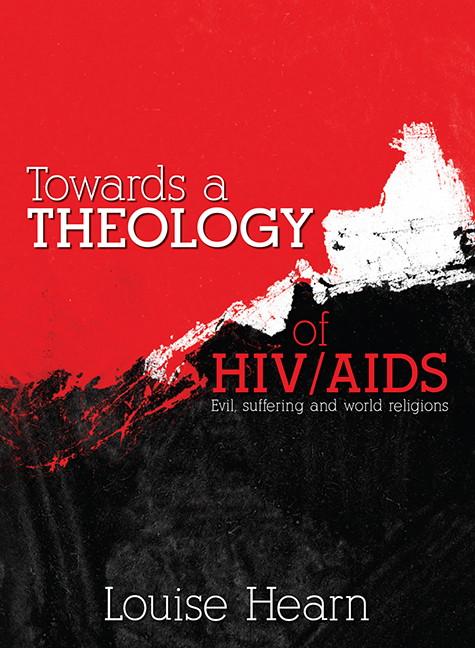Book contents
- Frontmatter
- Contents
- Foreword
- Chapter 1 Introduction
- Chapter 2 Evil and suffering
- Chapter 3 Inadequacy of theodicy
- Chapter 4 Understanding the interconnectedness of HIV/AIDS
- Chapter 5 Alleviating suffering due to AIDS
- Chapter 6 Towards a Theology of HIV/AIDS
- Appendix 1 Models for the interaction between text and reader
- Bibliography
- Index
Chapter 3 - Inadequacy of theodicy
Published online by Cambridge University Press: 18 February 2020
- Frontmatter
- Contents
- Foreword
- Chapter 1 Introduction
- Chapter 2 Evil and suffering
- Chapter 3 Inadequacy of theodicy
- Chapter 4 Understanding the interconnectedness of HIV/AIDS
- Chapter 5 Alleviating suffering due to AIDS
- Chapter 6 Towards a Theology of HIV/AIDS
- Appendix 1 Models for the interaction between text and reader
- Bibliography
- Index
Summary
Suffering arises not only from worldly issues or natural disasters, but also from and between sensemaking approaches which are termed religions or religious persuasions – even between different groupings within the same religion, being sects or denominations. Even the way that a human being approaches and makes use of the Bible as Holy Scripture demands a comprehensive sensemaking decision from that human being. Within this work an awareness of three basic approaches regarding texts, theories, natural processes and human doings underpins the debate. These approaches are termed mirroring-fundamentalist, interpretational-hermeneutical and consensible-negotiation approaches and a short discussion on these approaches is presented in the Appendix.
God outside (transcendent) and inside (immanent) reality
A favourite question of theologians grappling with the issue of theodicy is how a good omnipotent and all powerful, omniscient God could inject, introduce or allow evil in the world. Surely this question not only suggests a dualistic God, but distances God from the world. The question is not solved by quick and pious answers like ‘it is for our own good’. In many instances the good in ‘for our own good’ is not evident, especially, for example, in the case of a new born baby infected by HIV and ravaged by AIDS.
In terms of the ideology of theologism, several questions are being asked regarding God's role towards human beings and nature:
• Why did God instruct the offering of animals as part of the sacrificial system? (Assuming God directly delivered the instruction to people instead of people of the past who somewhere along the line ascribed offering of animals as an instruction from God.)
• Why does God allow human beings to kill, in His name, those who worship Him such as has happened with many missionaries as well as with the World Trade Centre in the USA on 9/11/2001? This is as if God is the all-initiating agent producing evil things in people's hearts and minds.
• Why does God allow natural disasters such as the devastation of the tsunami on 26/12/05 in Asia? Again, this is as if God is the all-initiating agent producing evil things in nature through the shifting of the tectonic plates way down below the surface of the ocean.
• Why did God not in His mercy just forgive his wayward creation? Such a theologistic question smacks of the utmost theological arrogance.
- Type
- Chapter
- Information
- Towards A Theology of HIV/AIDSEvil, suffering and world religions, pp. 50 - 69Publisher: University of South AfricaPrint publication year: 2013



